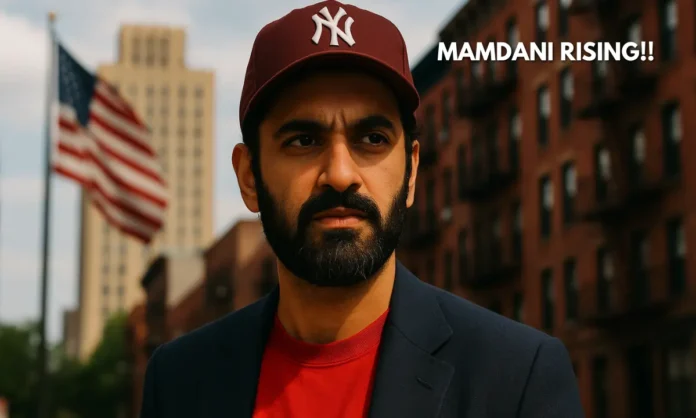Summary
- Zohran Mamdani, a 33-year-old Indian-origin Democratic Socialist, is emerging as a serious contender in the New York City mayoral race, sparking political debates in both the U.S. and India.
- His campaign agenda—free buses, rent freezes, public housing, and state-run grocery stores—echoes socialist policies that many Indians view as outdated or failed.
- In India, Mamdani’s rise is triggering polarized reactions, shaped by faith, ideology, and diaspora divisions, reflecting a deeper anxiety about global political identity.
America’s Capitalist Capital, India’s Socialist Déjà Vu
It is rare that a municipal race in the U.S. captures the attention of political observers in India with such intensity. But Zohran Mamdani isn’t just any candidate. A 33-year-old Muslim of Indian origin, a New York State Assemblyman, and a self-described Democratic Socialist, Mamdani has become a lightning rod in the cultural imagination of both New York and India. With a policy platform that includes free bus fares, universal childcare, public housing, and state-run grocery stores, Mamdani is unapologetically reviving the grammar of state-led welfare in a city that defines global capitalism.
While his rise is seen by many American progressives as refreshing and necessary, Indians—especially of a certain generation—view his proposals with a weary sense of déjà vu. What Mamdani offers New Yorkers is, in essence, a repackaging of India’s post-Independence socialist model—one that millions of Indians fled from, and which even the so-called ‘Right-wing’ BJP now quietly emulates through expansive welfare programs. In India, where the ghost of socialism never fully died, Mamdani’s vision feels oddly familiar—and divisive.
New York City, the heart of America, has just made a grave mistake by endorsing Zohran Mamdani, a 33-year-old socialist whose vision threatens to unravel everything we hold dear. His plan? Turn the Big Apple into a socialist experiment with government-run grocery stores,… pic.twitter.com/6ctBcCACH1
— Hosna ⚖️ (@DOGEQEEN) June 26, 2025
A Progressive Darling in Trump’s America
- Donald Trump has already labeled Mamdani “a 100 percent Communist lunatic” in a scathing post, linking him to the Democratic Left’s Squad.
- Mamdani supports Palestinian rights, opposes Israeli PM Netanyahu, and has taken strong anti-Trump positions—all of which put him at the ideological epicenter of American polarization.
- His appeal among New York’s young, especially in diverse boroughs, makes him a serious contender in a city that has increasingly embraced progressive leadership.
It’s no accident that Trump has chosen to amplify Mamdani’s rise—it’s the perfect ideological bait. As Trump ramps up rhetoric for another White House bid, Mamdani offers a caricature his base loves to hate: brown, Muslim, leftist, urban. But in New York, where Trump’s style is anathema to many, such attacks only fuel Mamdani’s political brand.
Support from Alexandria Ocasio-Cortez’s political wing, along with organic traction from Arab-American and working-class neighborhoods, signal a generational shift. For Mamdani’s supporters, this isn’t just about NYC—it’s about creating an “American socialism” that finally delivers what decades of liberalism could not: affordability, equality, and dignity in a city of obscene wealth.
India Reacts: Religion, Rhetoric, and the Reverse Diaspora Gaze
- In India, Mamdani’s Muslim identity and pro-Gaza stance have triggered a cultural backlash, especially among Right-wing commentators.
- Many refuse to see him as a success story of the Indian diaspora, unlike Rishi Sunak or Satya Nadella.
- Indian social media discourse frames his rise as a “conquest” of a Western city by the “wrong kind of Indian.”
Mamdani’s success in New York is curiously refracted through India’s communal prism. While Sunak’s rise to UK Prime Minister was celebrated with pride, Mamdani’s potential mayoral victory is sparking ideological unease. For Hindu nationalists, it is uncomfortable to acknowledge a Muslim voice from India ascending in the West—especially one so vocal against Israel and Modi.
Meanwhile, within India’s liberal circles, Mamdani’s campaign is inspiring—but also triggering. Many recall how similar socialist ideals—state-run ration shops, rent-controlled housing, and public transit subsidies—collapsed under inefficiency, corruption, and vote-bank politics. The fact that these very models are being repurposed as revolutionary in New York feels almost ironic.
The Seduction of Socialism in the Heart of Capitalism
- Mamdani promises to freeze rents on 2 million homes, build 200,000 units of social housing, and reintroduce government-run grocery stores.
- These ideas closely resemble India’s DDA housing, anganwadi childcare, and ration shop models of the 1970s–1990s.
- Critics argue that such models failed in India and are out of place in a city that thrives on open-market economics.
There’s a deeper cultural irony at play. The very socialist systems that generations of Indians left behind—through legal immigration or dangerous ‘dunki’ journeys—are now being proposed as solutions in America’s wealthiest city. Is New York finally rich enough to afford socialism, while India is still paying for its past experiments?
The appeal of Mamdani’s platform among young Americans speaks to a broader disillusionment with neoliberalism. In post-pandemic cities struggling with housing crises, economic inequality, and inflation, socialism now feels like the antidote rather than the disease. But to Indian ears, it’s a discordant melody—one that reminds them of ration queues, failing buses, and concrete housing slums built by corrupt urban agencies.
The Identity Test India Keeps Failing
What’s striking isn’t just Mamdani’s platform, but India’s reaction to it. If his name were Raj Patel, would the discourse be different? Probably. Mamdani is not just another Indian in global politics—he’s a mirror held up to India’s own contradictions.
His critics say he supports the ‘wrong causes,’ follows the ‘wrong ideology,’ and comes from the ‘wrong religion.’ But these reactions say more about India’s internal anxieties than about Mamdani himself. In a time when Indian identity is increasingly reduced to a singular narrative, Mamdani forces a pluralist counter-question: What does it mean to be Indian in a global, ideological, post-colonial world?
Mamdani might lose—or win—but either way, his campaign has exposed the layered hypocrisies of both American and Indian political cultures. In that sense, his candidacy has already achieved something rare: it has made voters in two of the world’s largest democracies look uncomfortably inward.


